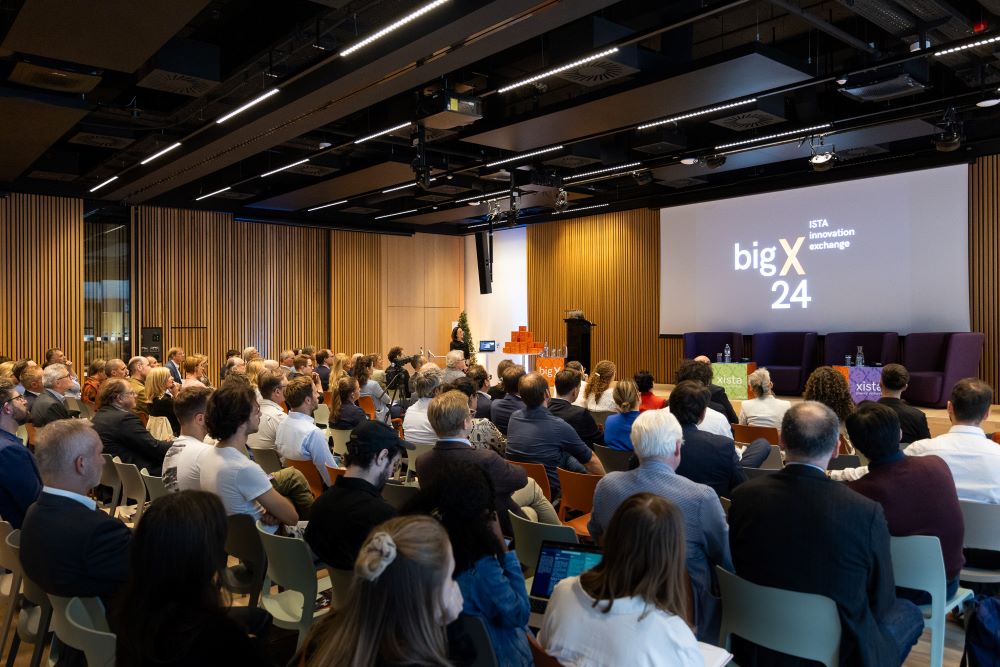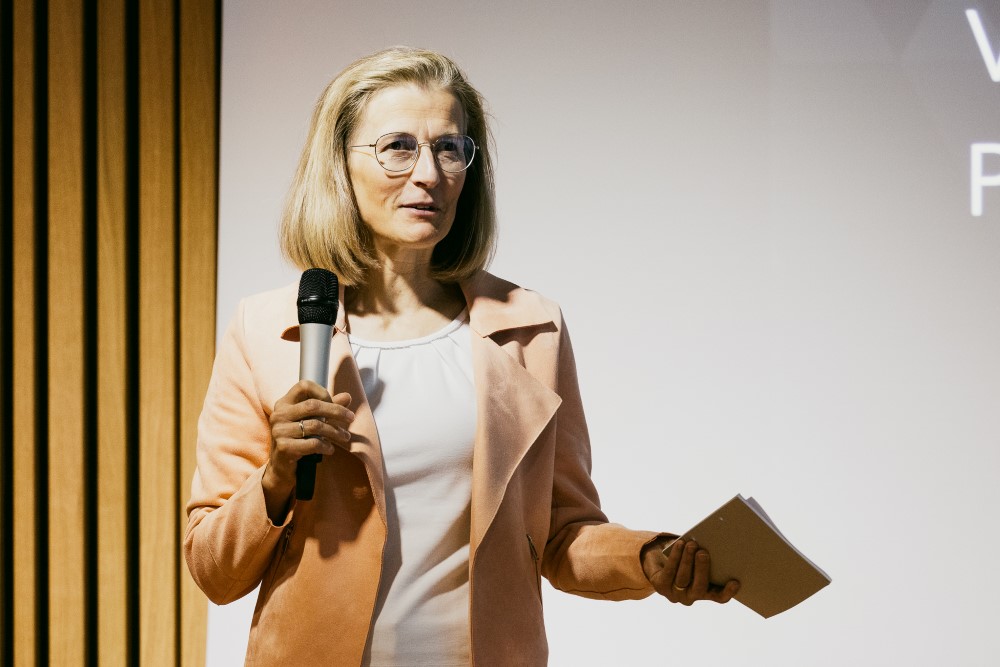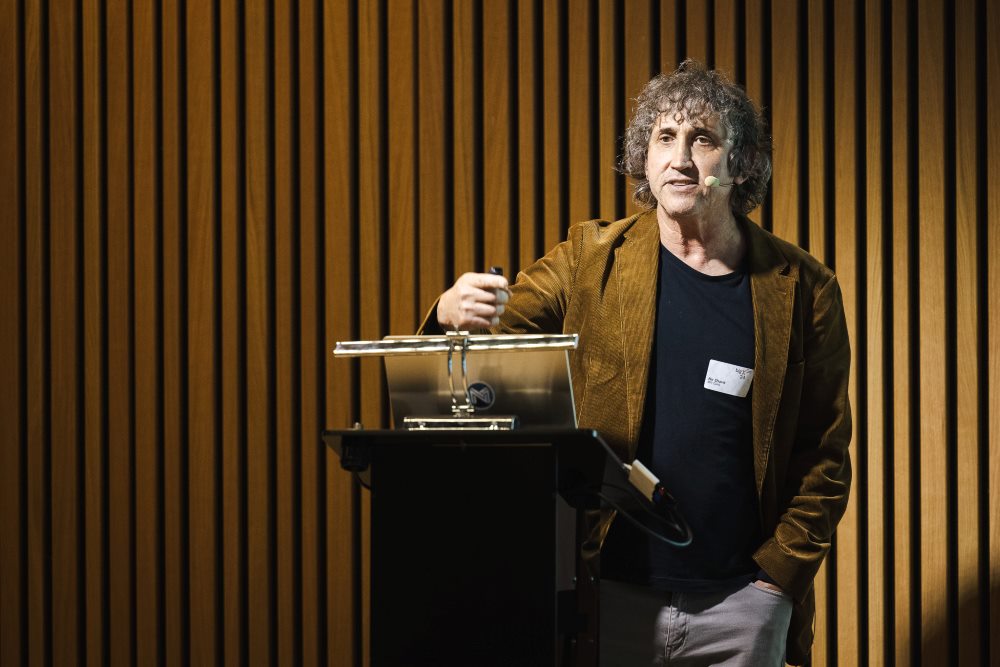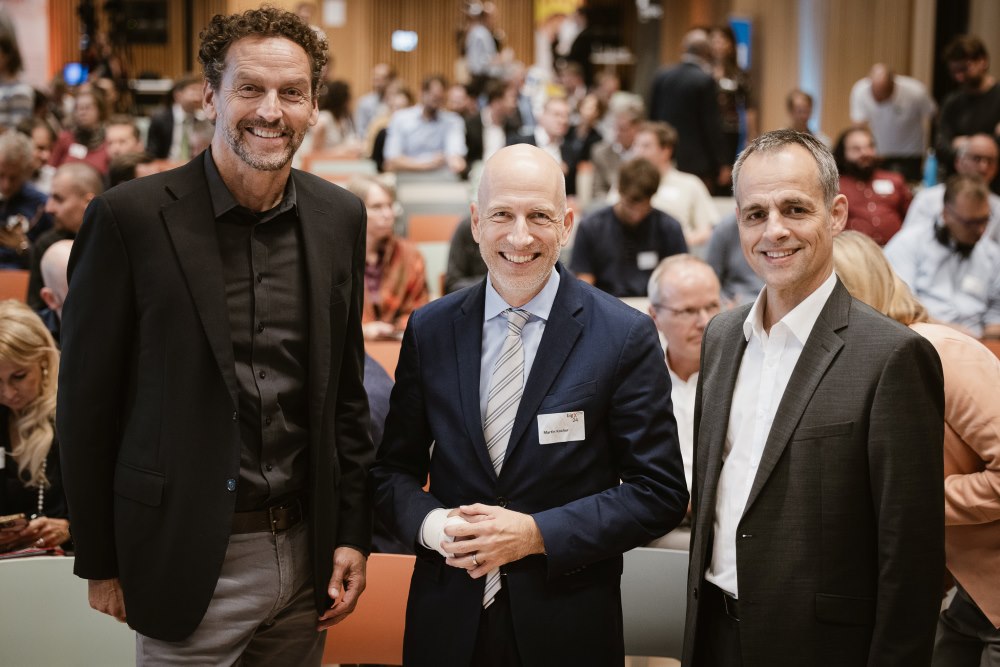September 23, 2024
Exploring the Future of AI
Recap of the fully booked bigX 2024 by ISTA, xista, and IV
This Thursday, Klosterneuburg became the nexus of groundbreaking artificial intelligence (AI) discussions as bigX 2024, the innovation exchange conference hosted by the Institute of Science and Technology Austria (ISTA), its tech transfer ecosystem xista, and the Federation of Austrian Industries rolled out another booked-out, stellar edition. This year’s theme, “The Future of AI,” resonated through a lineup of 15+ visionary leaders, researchers from top institutions like MIT, Oxford, and ISTA, and AI industry experts.

The event commenced with welcoming addresses by esteemed dignitaries including Monika Henzinger, Vice President for Technology Transfer at ISTA, Martin Kocher, Federal Minister of Labor and Economy of Austria, Markus Wanko, Managing Director of xista, and Isabella Meran-Waldstein, Director for Research, Technology, and Innovation of the Federation of Austrian Industries. They underscored bigX’s commitment to bridging science and industry to spearhead innovative advancements. “AI, which is based in computer science, plays an important role in connecting the broad scientific disciplines represented at ISTA. AI is also a strong bridge between academia and industry leading to enormous progress at a rapid speed in both. Thus, we are happy to co-organize this event with the Federation of Austrian Industries (IV) and thank them for this great cooperation. We are also especially excited to welcome international speakers from Oxford and MIT,” said Henzinger.

Keynote: From AI Research to Revolution
The spotlight then moved on Nir Shavit, a professor at MIT and Co-Founder of Neural Magic, who took to the stage to deliver the keynote titled “Tissue vs. Silicon: Musings on the Future of Deep Learning Hardware and Software.” Shavit, renowned for his contributions to multiprocessing algorithms and machine learning performance optimization, captivated the audience with his insights into the evolving landscape of deep learning, juxtaposing computational approaches inspired by neural tissues against traditional silicon-based computing paradigms. “The amount of computing our brain does is less than that of an iPhone. Our rush for ever-increasing computation shows us that we don’t understand the algorithm,” said Shavit.

Pioneering Research and Challenges
Following the keynote, the conference offered an array of specialized presentations addressing both theoretical and applied aspects of AI:
- AI Models & Architecture: A compelling video spotlight featured ISTA professors Dan Alistarh, Marco Mondelli, Francesco Locatello, and Christoph Lampert, as well as visiting professor Alex Bronstein. They presented avant-garde research on efficient, causal, and trustworthy machine learning models and their applications.
- Challenges and Perspectives: In a thought-provoking talk, industry experts such as Micah Adler from MIT CSAIL, Dan Alistarh from ISTA, Marco Porak from IBM Austria, and keynote speaker Nir Shavit discussed the pressing challenges and future directions of AI technology in commercial applications.
- AI in Life Science: A panorama of pioneering research highlighted AI’s transformative potential in life sciences. Presentations by ISTA professors like Florian Praetorius on de novo protein design, Sandra Siegert on microglial tracing in 3D, Johann Danzl on super-resolution microscopy, and Alicia Michael on visual proteomics showcased the intersection of AI with biology, neuroscience, and medicine.
- AI in Biotech & Pharma: A panel comprising Michael Bronstein from Oxford’s DeepMind, Troy Dale from Novartis, biochemist Alicia Michael from ISTA, and Carmen Visus from AOP Health elucidated the integration of AI within biotech and pharma industries, anticipating future innovations and collaborations.
Michael Bronstein, appointed this week as the first Scientific Director of AITHYRA, a new research institute for AI and Biomedicine in Vienna, founded by the Austrian Academy of Sciences (OEAW) and Boehringer Ingelheim Foundation, said, “AlphaFold, the biggest AI-driven breakthrough in structural biology, was trained on very expensive data collected by human scientist for human scientists’ use. I envision the next step will be designing new data sources for primary machine learning use.”
Ethical and Regulatory Insights
The dialogue on AI would be incomplete without addressing its ethical and regulatory dimensions. A panel discussion featured Misha Glenny, Rector of the Institute for Human Sciences; Nadine Nehme, Co-Founder of Medicus.AI; Noah Oder from OECD.AI; and Christiane Wendehorst from the European Law Institute. This segment underscored the imperative of ethical governance and robust policy frameworks to steer AI towards a societal good.
Multiple industry representatives and a focus on tech transfer
BigX 2024 was booked out within three weeks of its advertisement. It attracted around 300 attendees including industry representatives from Siemens Energy, Strabag, Novartis, AOP Health, Boehringer Ingelheim, and Takeda, among others. To set the focus on technology transfer, multiple xista science ventures portfolio startups were represented at booths. These included Contextflow, Infrared City, Syntropic, and nista.io, in addition to keynote speaker Nir Shavit’s US-based startup Neural Magic, whose Principal Research Scientist is ISTA Professor Dan Alistarh.
“Beacon for exchange between science and economy”
As the sun set, the formal sessions transitioned into an afterparty filled with dialogue, networking, and celebration. Attendees—ranging from academic researchers to industry representatives—shared newfound knowledge, fostered collaborations, and envisioned future projects.

“bigX 2024 was a confluence of minds committed to pushing the boundaries of AI innovation. With vivid discourses, forward-looking research showcases, and stimulating panel discussions, the event delivered a panoramic view of AI’s future, highlighting its potential across diverse sectors,” said xista Managing Director Wanko. “When I saw attendees head home with new ideas and connections, the promising horizons of AI innovation felt more tangible than ever. Looking ahead, bigX remains a beacon for interdisciplinary exchange between science and economy, aspiring to continually inspire and shape the trajectory of technological progress.”



